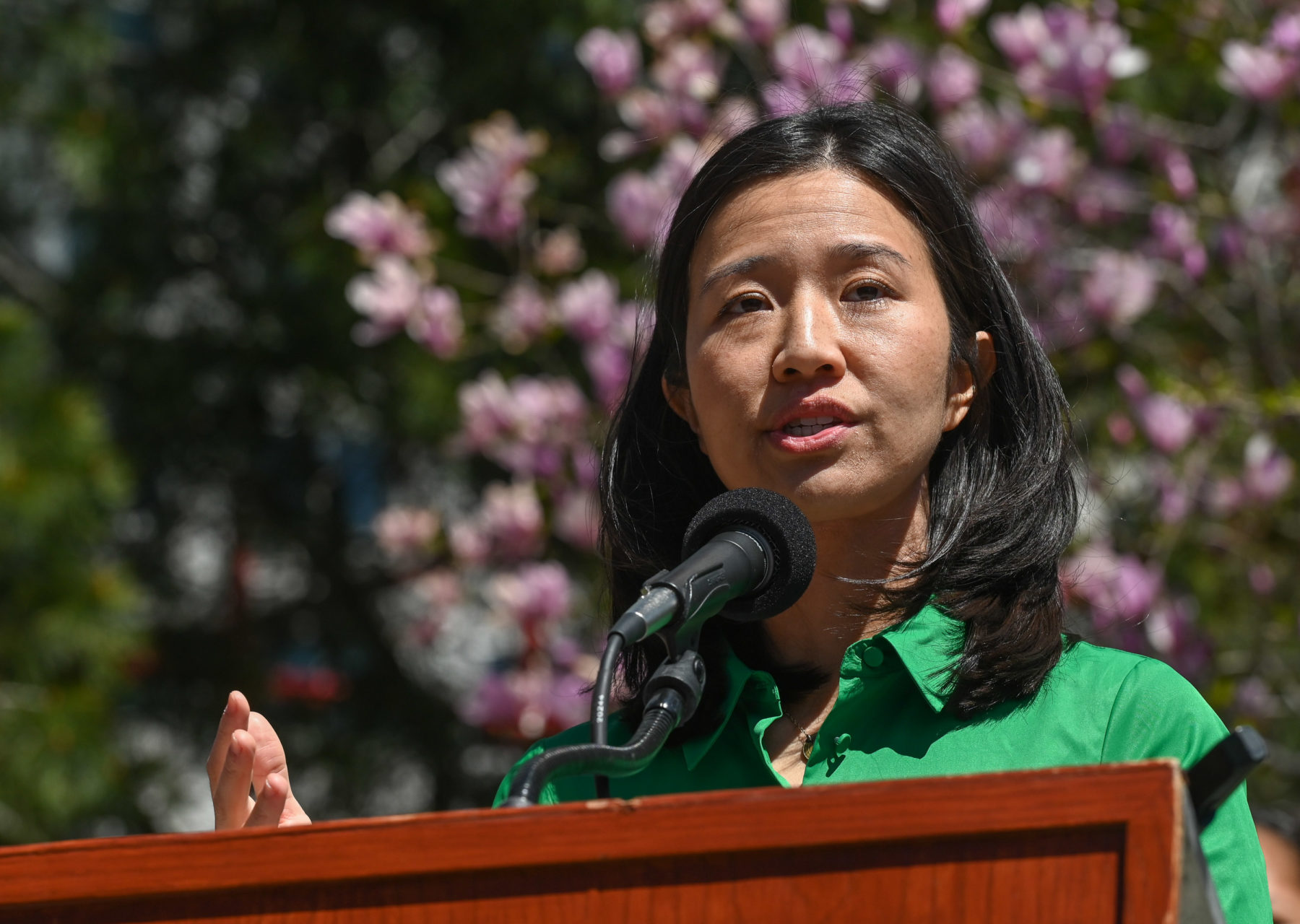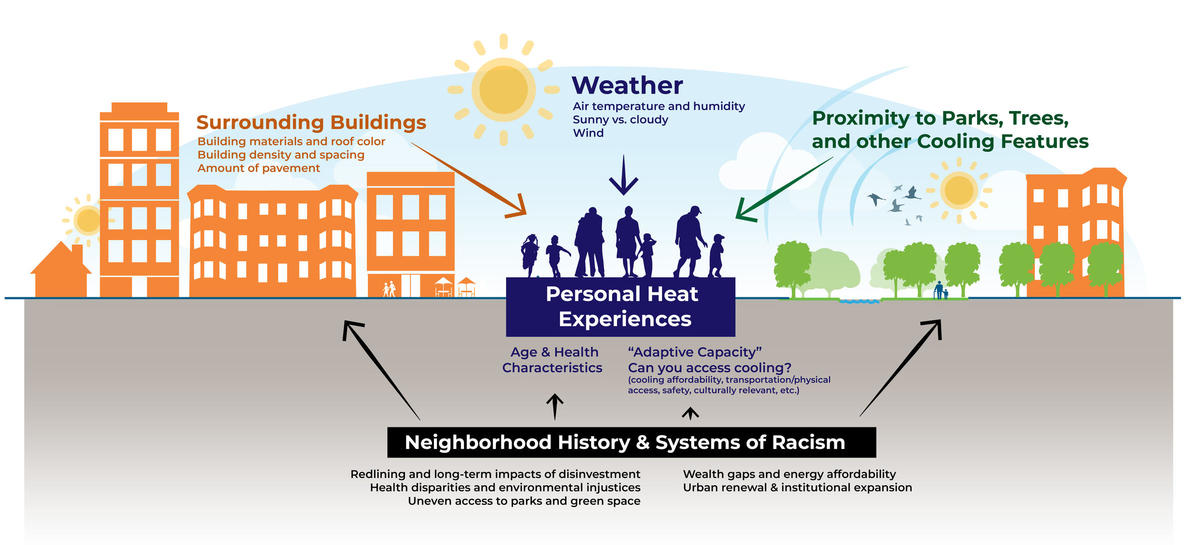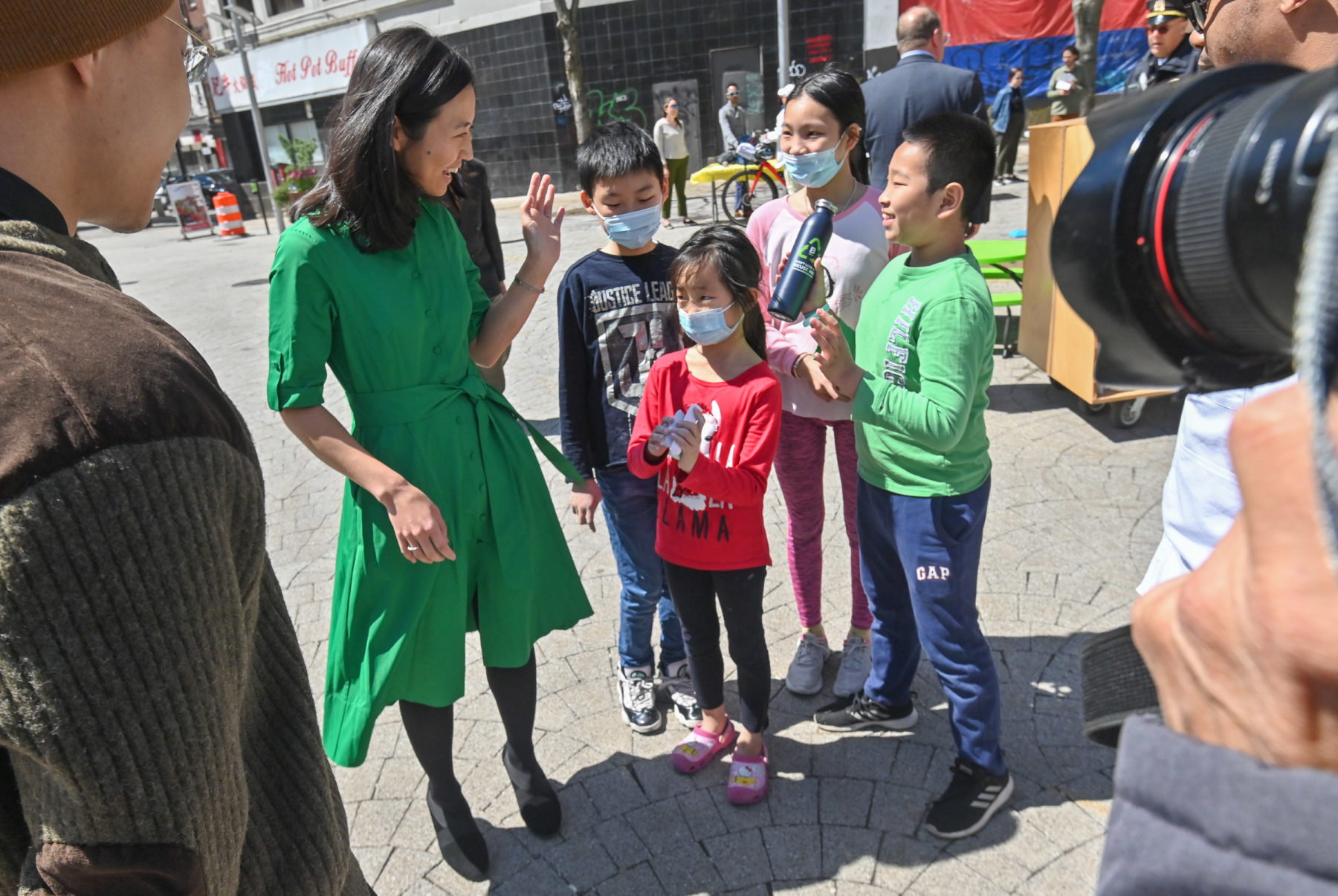Cool Spot Pop-ups Offer Bostonians a Respite from Heat
Part of the City of Boston Heat Resilience Study, these pop-ups will hold community events throughout the summer
 Sasaki
Sasaki

Boston, MA — April 22, 2022 — Today, Mayor Michelle Wu hosted an Earth Day celebration at Auntie Kay & Uncle Frank Chin Park on the Rose Kennedy Greenway in Chinatown and announced Heat Resilience Solutions for Boston, a citywide framework to prepare Boston for hotter summers and more intense heat events. The Heat Plan presents 26 strategies that will help build a more just, equitable, and resilient Boston. In addition to citywide strategies, the Heat Plan focuses on five environmental justice communities that are hotspots in Boston and experience greater burdens as temperatures increase: Chinatown, Dorchester, East Boston, Mattapan, and Roxbury.
“Extreme heat in Boston is more than an inconvenience or discomfort—it’s an urgent risk for our health, our neighborhoods, and our infrastructure,” said Mayor Michelle Wu. “Our Heat Resilience Solutions report presents Boston’s roadmap for navigating extreme heat, particularly for our environmental justice communities. This study centers people and reinforces our commitment to a Boston Green New Deal.”
The Heat Plan is a critical component of Climate Ready Boston, the City’s initiative to prepare for the near- and long-term effects of climate change, like sea level rise, coastal storms, extreme precipitation, and extreme heat. The report builds on heat preparedness work to date and outlines infrastructure and programmatic strategies that will help address the growing risks of hotter summers and extreme heat in Boston. The strategies identified in the Heat Plan will work together with the Urban Forest Plan to improve tree protection, stewardship, and new plantings for nature-based cooling solutions. The consultant team supporting the project included Sasaki, Klimaat, All Aces, and WSP.

Heat experiences are more than just the weather. Buildings and proximity to green and open spaces also play a role. Influencing these factors is neighborhood history and systems of racism, which places disproportionate burdens of Boston’s heat on communities of color, immigrants, low-income residents, and unhoused communities.
“Chinatown has long experienced the heat island effect, and many of our Chinatown residents have to endure high temperatures during the summer with no access to air conditioning or shades from tree canopies,” said Council President Ed Flynn. “As we continue to experience high temperatures and extreme weather due to climate change, we need to work together to address extreme heat in our communities. I want to thank Mayor Wu and her team for implementing strategies that will help keep our residents healthy during high temperatures, and help our neighborhoods prepare for extreme heat events. I look forward to continue working together with the Wu Administration, our residents, and community leaders on making sure that residents in Chinatown and other communities can live safely and comfortably during days with high temperatures.”
“As we grapple with the impact of climate change on our most vulnerable communities, the Heat Resilience Solutions for Boston report offers the type of creative interventions necessary to ensure we are a climate-resilient city,” said City Councilor Kendra Lara. “I’m excited to join Mayor Wu and Chief White-Hammond in stewarding this plan.”
Boston is already experiencing the effects of climate change. Over the last decade, Boston experienced more hot days and nights than any decade in the previous 50 years. The Heat Resilience Solutions report focuses on community-driven solutions to prepare and protect our neighborhoods for the effects of extreme heat. Climate Ready Boston completed a redlining analysis to explore neighborhood histories and systemic inequalities in Boston that resulted in certain communities facing greater burdens from climate change. The analysis showed that redlined areas are 7.5°F hotter in the day, 3.6°F hotter at night, and have 20% less parkland and 40% less tree canopy than areas designated as “A: Best”. By taking a people-centered approach to heat resilience, the City of Boston can prepare our residents and communities for extreme heat in a way that addresses systemic inequities to support a thriving, Green New Deal city.
“As the climate changes, Boston will experience increasingly higher average temperatures over time and heat waves will become more common, last longer, and be hotter,” said Reverend Mariama White-Hammond, Chief of Environment, Energy and Open Space. “Past decisions made by the public and private sector have led to increased heat risk in our environmental justice communities. This report is about doing the work to protect the entire city beginning with those communities that are bearing the biggest heat burdens.”
The three-phase plan consists of an analysis of extreme heat, a comprehensive series of strategies, followed by an implementation roadmap for delivering on the strategies. To support the implementation of the Heat Plan, the City will launch the Boston Extreme Temperatures Response Task Force, which will help deliver a unified, all-of-government response to address chronic high temperature conditions and prepare the city in advance of extreme heat events. The Task Force’s work will be supported by the Environment Department, the Office of Emergency Management, and the Boston Public Health Commission’s Office of Public Health Preparedness with the goal of collaboratively protecting and promoting the health and wellbeing of Boston residents facing increasing temperatures and other climate risks.
In addition to transformational climate resilience investments proposed in Mayor Wu’s first budget, the City is taking critical immediate action to provide heat relief. Moving forward, the City is taking short-term, actionable steps toward relief during heat waves, including City operations and communications, cooling opportunities, and public education. To expand upon the recommendations proposed in the report, the City of Boston will be engaging in a variety of catalytic projects to support extreme heat mitigation, advance economic opportunity, reduce carbon emissions, and improve health for residents and the environment. These pilots include:

Mayor Michelle Wu hosted the Earth Day celebration at Auntie Kay & Uncle Frank Chin Park on the Rose Kennedy Greenway in Chinatown
“Chinatown residents disproportionately experience environmental stressors like air pollution, rising sea levels, and extreme heat,” said Karen Chen of the Chinese Progressive Association. “I am grateful to Mayor Wu for sharing the Heat Plan and taking action to protect our communities from the impacts of climate change.”
“All of the neighborhoods surrounding The Greenway will be impacted by the continued effects of climate change, but no neighborhood is impacted by the effects of increased heat more than Boston’s Chinatown,” said Chris Cook, Greenway Conservancy Executive Director. “We are honored to partner with Mayor Wu and her administration on actionable first steps to address these circumstances for the residents of Chinatown.”
The critical actions laid out through the Heat Plan reinforce the Wu administration’s commitment to supporting a healthy, local ecosystem, and a thriving green economy. Last week, Mayor Wu shared her administration’s first proposed budget which includes groundbreaking investments in climate action to create a Green New Deal city. These investments, which further key strategies identified in the Heat Plan, include $2.5 million for a new Climate Ready Streets program within Climate Ready Boston to deliver on heat resilience, stormwater management, and air quality on key transportation corridors, $20 million for a nation-leading pilot for energy retrofits in triple deckers and other multi-family homes while maintaining affordability, $2.5 million of ARPA funds to grow and preserve our urban tree canopy, including an innovative pilot program on private land, $2.5 million in electrifying school bus infrastructure, a $6 million ARPA investment to scale Youth Green Jobs, and $137 million in capital funding, plus operating investments, to create and protect parks, the tree canopy, and open spaces in the city.